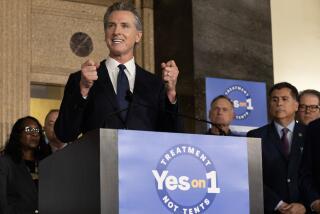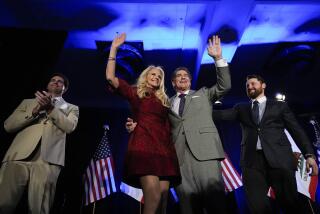Can Campaigns Compete With Simpson Coverage? : Politics: Candidates could be overlooked in weeks before Nov. 8 election. Strategists adjust their planning.
- Share via
It’s Tuesday, Nov. 8, and the O.J. Simpson murder trial is heading toward a dramatic conclusion.
Oh yes, it also is Election Day in California. Republican Pete Wilson is in a bitter down-to-the-wire contest with Democratic challenger Kathleen Brown for the governorship, the nation’s most important electoral contest this year. A pivotal U.S. Senate seat will be decided along with hundreds of other state and local races.
In an era of declining voter participation--and a populace transfixed by the Simpson trial unfolding on television--could this truly be the year when they hold an election and no one comes?
Acting Secretary of State Tony Miller, California’s chief elections officer, pondered that scenario for a moment and cracked: “If he’s on the stand on the eighth of November, we simply shut the process down. I’m not even going to show up.”
At this point, of course, no one can say whether the Simpson trial will begin as scheduled Sept. 19. Or if it does, whether Simpson would take the stand.
But in small ways and large, the murder case that has drawn unprecedented national attention is forcing California’s campaign managers and politicians to rethink their plans.
Republican Senate candidate Mike Huffington this week agreed to debate Sen. Dianne Feinstein (D-Calif.) on television, but only if the encounters are held before Sept. 19. “Because after Sept. 19, nobody will be paying attention anymore,” said Marc Thiessen, Huffington’s press aide.
If Simpson’s trial on charges of slaying his former wife Nicole Brown Simpson and her friend Ronald Lyle Goldman does begin in September, jury selection could take several weeks and the trial easily could run through the rest of the 1994 election campaign. Obliterate it, in the view of some.
Even a relatively routine Simpson murder trial in the closing seven weeks of the campaign becomes “a campaign manager’s nightmare,” said Darry Sragow, a veteran Southern California campaign strategist who managed Insurance Commissioner John Garamendi’s unsuccessful bid for the Democratic nomination for governor this spring.
“The O.J. trial screws up the best of campaign plans because it diverts attention. And it’s tough enough in California, particularly Southern California, to get the attention of voters in a campaign,” Sragow added.
*
Major events always have an impact on election campaigns. In 1990, the sudden prospect of war in the Persian Gulf shifted attention away from the campaign for governor. Two years ago, the Los Angeles riots froze the U.S. Senate primary campaigns in place for several weeks.
The Simpson case has been so extraordinary that it may have a larger impact. Campaign officials cannot recall any similar event that has so dominated the news and so captured public attention for such a sustained period.
If the trial gets anything like the attention of the preliminary hearing, the first half of most newscasts will be devoted to its coverage every day, just as candidates are vying to get attention.
In general, campaign experts say that incumbents, better known candidates, those in the lead and Republicans most likely would benefit from events that distract attention from the political campaign.
The pretrial proceedings already have had an impact. John Whitehurst, press secretary for Kathleen Brown’s campaign for governor, said Brown’s appearances are scheduled carefully so they do not conflict with Simpson case events. Otherwise, it is a good bet that all the TV news cameras will be at the Criminal Courts Building, not at the Brown appearance.
But Whitehurst said that by staging Brown events at locations near the courts building, but not in direct conflict with a Simpson appearance, the candidate is more likely to draw news crews.
“This is most difficult on our campaign,” Whitehurst said. “As a challenger, one of the key jobs is to demonstrate Wilson’s failures in the press every day. That challenge gets harder if we don’t have as much opportunity to get on television.”
Whitehurst and others are hard at work trying to calculate the impact of a Simpson trial on their campaigns. A sampling of California political experts offered some theories about what might happen if the voting public is riveted on Simpson while candidates desperately seek attention:
* The effect could be particularly devastating to candidates running statewide campaigns other than the high-profile races for governor and U.S. senator--lieutenant governor, controller, treasurer, attorney general and the like. Such an impact would be accentuated by the fact that Wilson and Atty. Gen. Dan Lungren are the only incumbents in statewide offices who are seeking reelection to their posts this year. Lots of newcomers are struggling to get known.
Television exposure of candidates for these lesser offices could be virtually wiped out in the event of a Simpson trial.
* Diminished coverage of the election campaign would tend to help incumbents or better-known officials running for other offices. As Whitehurst, the Brown aide, noted, challengers usually have a more difficult time getting their message across than well-known incumbents.
George Gorton, Wilson’s reelection campaign manager, said: “I think it tends to help people who are ahead, who are better known, who command the news.”
In other words, watch the polling results in mid-September because they might not change as much after that as they would in a “normal” election year.
* The voter turnout on Election Day could drop sharply from past election years, even if Simpson is not on the stand that Tuesday, said elections chief Miller, who is running for office himself.
“They will not have been focusing on the candidates and measures,” he said. “When they don’t know about the candidates and measures, they don’t vote. They stay away. It’s not good news for the process at all.”
In general, campaign experts believe that low voter turnout benefits Republican candidates and issues because Republicans are more consistent voters.
* Campaign strategists fear that extensive live television coverage of the trial might limit the amount of commercial time they can buy for the TV ads that are so critical to any statewide election campaign in California, especially in the weeks immediately before the election.
*
But ad slots that might become available next to trial coverage or during breaks in the court proceedings would become prime time for campaigns because of the expanded daytime viewing audience lured by the trial coverage.
Miller said potential voters would pay more attention to the candidate profiles and statements in the official secretary of state’s ballot booklet that goes to every registered voter. He added that he will encourage absentee voting to make it easier to vote in the weeks leading up to Nov. 8.
Some speculate that the Simpson trial might provide an edge of sorts to Wilson because it would keep crime in the spotlight. Crime is the keystone issue in Wilson’s campaign. Sragow said that might be countered by the exposure the trial might give to the issue of domestic violence, to Brown’s benefit.
Or, he added, “it could help both.”
Just as Sragow was making his comments, the Brown campaign was distributing the candidate’s schedule for the next day. The first event: a news conference on domestic violence at a women’s shelter in Santa Monica.
More to Read
Get the L.A. Times Politics newsletter
Deeply reported insights into legislation, politics and policy from Sacramento, Washington and beyond. In your inbox twice per week.
You may occasionally receive promotional content from the Los Angeles Times.










